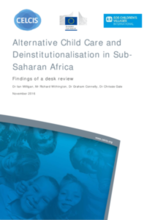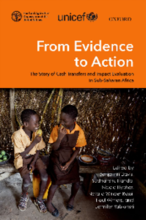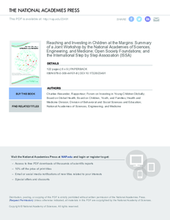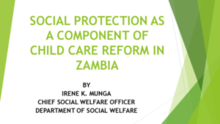Displaying 191 - 200 of 456
The Africa’s Agenda for Children, to be adopted by the Committee, presents measurable goals and priority areas to which the African Union and its Member States commit themselves for the coming 25 years.
This desk review provides a brief mapping and summary of existing knowledge on alternative care and deinstitutionalisation in Africa.
This study underscores the fact that visible minority families receiving child protective services are a far from homogeneous group and that there are a number of effective methods that can be used with them.
This article examines how urban Congolese refugees in Kenya promote psychosocial well-being in the context of structural vulnerability.
This paper explores the ways that developmental science can inform and strengthen the child welfare system to better support the children, families, and communities it serves.
This book published jointly by FAO, UNICEF, and Oxford University Press presents the findings from evaluations of the Transfer Project, a cash transfer project undertaken in the following sub-Saharan African countries: Ethiopia, Ghana, Kenya, Lesotho, Malawi, South Africa, Zambia, and Zimbabwe. It concludes that cash transfers are becoming a key means for social protection in developing countries.
To examine the science, economics, and politics of investing in the health, education, nutrition, and social protection of children at the margins, the Forum on Investing in Young Children Globally (iYCG Forum) held a workshop in Prague, Czech Republic, on November 3–4, 2015, titled, “Reaching and Investing in Children at the Margins.” This report summarizes the workshop and highlights the key learning from the event.
This presentation from the Department of Social Welfare, given at the Zambia National Consultation to Accelerate Care Reform, describes the Zambia Law Development Commission and its work, discusses the need to integrate social protection with child protection to meet the needs of vulnerable children and families in Zambia.
This brochure outlines the Public Welfare Assistance Scheme, including its objectives, types of assistance provided, social and educational support provided, eligibility and how to access services.
This article examines the discoursal shift to “reintegration” within trafficking protection programmes and policy, with emphasis upon Cambodia.








